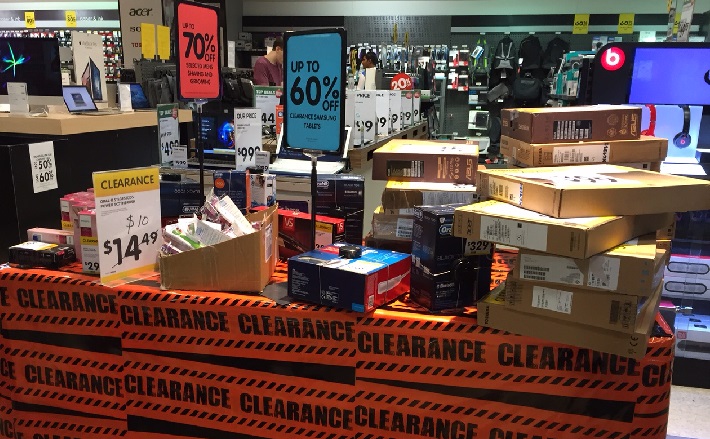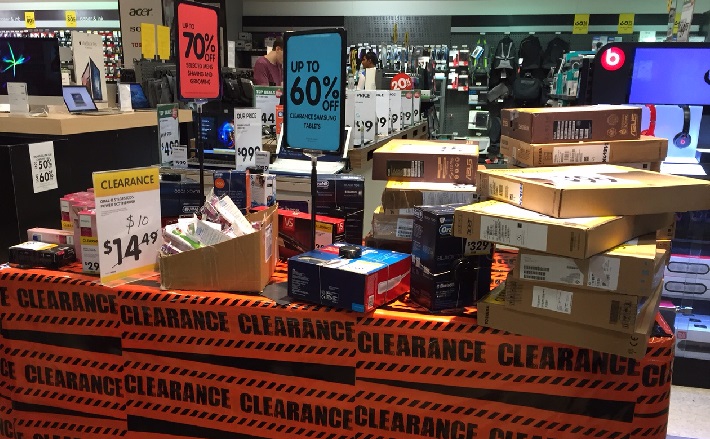Veteran tech retailer now in administration.
Dick Smith’s public crisis came to an abrupt end late yesterday when the company’s lead bankers, NAB and HSBC appointed James Stewart from Ferrier Hodgson as receiver. The company, overwhelmed by debt and unable to pay suppliers to secure stock, then called in McGrathNicol to act as its voluntary administrator.
In a statement to the Australian Securities Exchange late yesterday, January 4, Dick Smith Holdings chairman Rob Murray bluntly laid out the circumstances which bought down the iconic retail brand.
“It is with considerable regret that the Board of Dick Smith Holdings has placed the Company into Voluntary Administration.
Sales and cash generation were below management expectations, continuing a trend experienced during 2Q2016. The Company explored alternate funding, however the Directors formed the view that any success in obtaining alternate funding would not have been sufficiently timely to support short-term funding requirements and allow the Company to order required inventory during the next four to six weeks.
Whilst confident on the long term viability of the Company, the Directors have been unsuccessful in obtaining the necessary support of its banking syndicate to see it through this period. The Directors are of the view that without this support, there is no option other than to appoint a Voluntary Administrator.
Appliance Retailer has spoken with McGrathNicol this morning and they are preparing a statement that will be released later today.
Ferrier Hodgson takes the lead
At just after 10.30am this morning Ferrier Hodgson also released this statement.
“Dick Smith Holdings Ltd, (DSH) one of Australia’s largest electrical retailers, was placed in receivership today following the appointment of Voluntary Administrators.
Ferrier Hodgson partners James Stewart, Jim Sarantinos and Ryan Eagle were appointed Receivers and Managers over DSH and a number of associated entities. The appointment was made by a syndicate of lenders which hold security over the group.
Receiver James Stewart said it was too early to clearly identify the primary causes of the company’s current financial position and the reasons for its decline other than saying the business had become cash constrained in recent times. He said it would be business as usual while the Receivers look at the restructuring and realisation opportunities for the Group.
“Dick Smith is one of the best known brands associated with consumer electronics in Australia and New Zealand.” Stewart said. “We are immediately calling for expressions of interest for a sale of the business as a going concern.”
Stewart said that employees will continue to be paid by the Receivers and that it is expected that Australian employee entitlements will be covered under the Fair Entitlements Guarantee (FEG) scheme if the business cannot be sold as a going concern.
Stewart said that the New Zealand business was profitable and expected it would be attractive to potential buyers. He also stated that due to the financial circumstances of the Group, unfortunately, outstanding gift vouchers cannot be honoured and deposits cannot be refunded.
Affected customers will become unsecured creditors of the Group.
From entrepreneurial genius to private equity disaster
In 1968, Dick Smith founded electronics retailer Dick Smith Electronics as a small car radio installation business in the Sydney suburb of Neutral Bay, New South Wales. In 1982, he sold the business to Woolworths for $22 million.
On 27 September 2012 Woolworths announced that the private equity firm Anchorage Capital Partners would purchase Dick Smith Electronics for $20 million with the transition between Woolworths and Anchorage being finalised on 27 November 2012. It was later reported that this was only part payment with Anchorage Capital Partners paying a further $74 million to Woolworths making the total payment $94 million.
However, some market analysts raised concerns early over Anchorage Capital Partners acquisition which saw it float the electronics retailer one year later with a market capitalisation of $520m. Dick Smith disclosed it had loans and borrowings totalling $70.5m as of June last year, with the capacity to borrow up to $135m. But it did not disclose what covenants were associated with this debt facility.
Credit Suisse’s Grant Saligari and Troy O’Dwyer last month said the company’s sustainability in its current form depended on creditors, with Dick Smith financed on the basis of 90-day and 120-day payable, making it “susceptible if creditors tighten payment terms”.
Dick Smith employs over 3,300 staff and operates 390 stores across Australia and New Zealand (largest by store footprint). Store network consists of, in Australia, 286 Dick Smith stores, 30 David Jones Electronics Powered by Dick Smith stores and 9 Move stores, and in New Zealand, 61 Dick Smith stores.
In this newsletter we have drawn a timeline of reporting on the fall of Dick Smith since July 2015.


